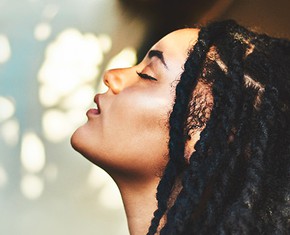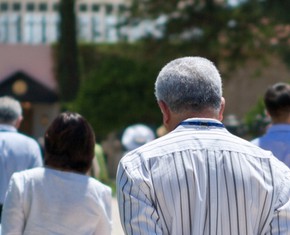The views expressed in our content reflect individual perspectives and do not represent the authoritative views of the Baha'i Faith.
Coping with the death of a loved one can be very difficult and painful. That said, every second brings us closer to our own deaths. How can we possibly cope with that?
There will come a time when we each will have to face and accept the end of our own lives.
While the Baha’i teachings about life after death present it as a very positive and beautiful transition to an eternal afterlife, the fact remains that no one fully knows what happens after we die. It seems impossible for the human mind to grasp the next life, just as the embryo in the mother’s womb cannot comprehend this earthly existence.
Like many of us, I’ve been thinking about this a lot lately due to the coronavirus pandemic. I’m trying my best to protect myself. Either I’m going to get the virus or I’m not. If I get it, with God’s help, I’ll do my best to handle it and heal from it. But one fact remains: I’m either going to live through it, or die from it. In any case, I’m trying my best to put my complete trust in God.
Whatever finally does cause my death, I’ve realized that I must be able to face it, accept it, deal with it, grieve it, grow from it, and even try to be joyful about it. After all, when I die I won’t have to shave anymore. (I’ve never enjoyed shaving.)
I’ll be forced to let go of this world, of every person and everything in it I’ve ever loved or known. No one has any choice about these things. The only choice I have is my attitude toward my own death.
Sure, I can say that death will be a new adventure. When I think about all the adventures I’ve had in my life, this approach sounds good. After I die, I’ll discover things I’ve never experienced, and hopefully I’ll enjoy my new discoveries.
But to be frank, because death remains an unknown for everyone, I really have no idea what I’m talking about. We can ponder this deeply, but no matter how hard we try, we cannot truly grasp what we’re going to experience after our physical bodies die.
The more I’ve contemplated this, the more I’ve come to realize how much courage is required to face and accept my own death. I’ll be honest with you: I’m frightened of the unknown. I’m afraid of God’s justice. I expect I’ll be asking God for forgiveness throughout eternity. I can only hope my aspirations toward nobility will exceed my regrets.
The Baha’i writings say that God’s justice is very great – but also that His grace is “infinite,” “unfailing,” and “all-encompassing.” If God’s grace didn’t exceed His justice, being the fallible human beings we are, we wouldn’t stand a chance.
On this weighty subject two quotations from Baha’u’llah, the founder of the Baha’i Faith, have always perplexed me, especially as they appear so close together in the same book. Speaking with the voice of God, Baha’u’llah wrote:
O Son of the Supreme! I have made death a messenger of joy to thee. Wherefore dost thou grieve? I made the light to shed on thee its splendor. Why dost thou veil thyself therefrom? – The Hidden Words
But just above this verse we read the following:
O Son of Being! Bring thyself to account each day ere thou art summoned to a reckoning; for death, unheralded, shall come upon thee and thou shalt be called to give account for thy deeds. – Ibid.
Which makes me wonder: how can I look forward to death when I’ll be required to “give account” for my deeds?
I’m not a bad person. Quite the contrary, I’m a good human being. I’ve led a good life, and done countless positive things. Through intense personal counseling and a broad range of life experiences, I’ve learned a lot. Certainly, I try to be a good Baha’i. But in spite of these things, like all human beings, I’ve made a huge number of mistakes, some more serious than others.
I do fear God’s justice, but I’m really hoping that God, who knows my heart, my past, present, and future, will indeed forgive me. But if He doesn’t I will understand: again His justice is very great and I’ve screwed up, sometimes very royally.
The bottom line: I’ll do my very best to face and accept my own death when it occurs. I’ll try to do everything in my power to live and die a staunch Baha’i until and including my last breath – my supreme purpose in life. If I feel sad, frightened, physical pain, angry with myself, joy, gratitude, or any other feelings, I will accept all my thoughts and feelings as real and valid. I will give myself permission to cry and grieve, as well as to laugh. I will pray, and I will continue trying my best to put my complete trust in God’s unbounded love for me as one of His creatures, a love so vast I cannot comprehend it, even though I’m sure He has not always approved of my behavior.
When God wants to take my soul to the next life, I will leave this Earth; my journey here will be over forever. Writing this article and sharing it with you will hopefully help me face and accept my own death.
















Comments
Sign in or create an account
Continue with Googleor